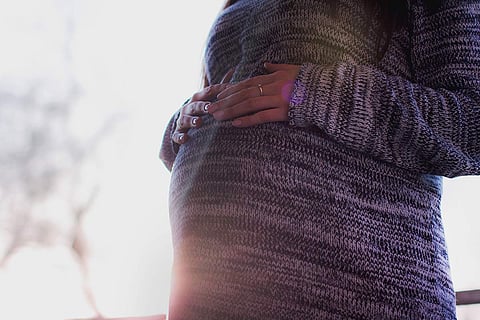

With several women apprehensive about visiting hospitals even for their routine check-ups, what can they do to ensure that they have a healthy pregnancy and safe delivery
Doctors from Sakra World Hospital in Bengaluru explained in webinar what precautions pregnant women and their loved ones can take to stay safe during the pandemic.
“Many of our regular patients call us saying that they are scared to come in for a check-up at the hospital and want to know if there are alternatives,” said Dr Prabha Ramakrishna, Senior Consultant and Head of Obstetrics and Gynaecology at SAKRA World Hospital. He pointed out the revised guidelines of the Indian Council of Medical Research (ICMR), which says that pregnant women need not visit hospitals for consultation and can speak to a doctor via video call or email.
However, she also notes that it is important and vital that women do get a few examinations done in person.
“First trimester screening is done at the 12th week, which is mandatory and women should come for these check-ups. The anomaly scan, which is done between 18 and 20 weeks of pregnancy, or around the fifth month of pregnancy, also requires a hospital visit. Following this, another check-up can be done in the seventh month and the woman should also come for another visit during week 36 (ninth month) as she gets closer to her due date,” explained Dr Prabha.
Blood tests required in between can be done at home with the help of several labs, which now offer sample collection at home. The reports can be shared with a doctor via email or during a video consultation.
“Apart from the mandatory visits, it is better to stay home unless there is an emergency. However, keep in mind that if the doctor recommends a visit in person to the hospital, it is important and should be taken seriously,” she said.
A woman whose pregnancy is considered ‘high risk’ should also follow-up with doctors regarding consultations. This includes women with chronic conditions, including heart or kidney disease, with twin pregnancies, or those who have a history of miscarriages.
“In addition to basic precautions such as using masks and practising hand hygiene, these pregnant women should also take extra care to avoid exposing themselves to someone who may be sick,” advised Dr Chitra S, Senior Consultant Obstetrics and Gynaecologist at Sakra World Hospital.
“They may be more vulnerable than others but a planned visit to the doctor can be more beneficial than staying at home,” she added.
Dr Prabha also noted that the scan during the first trimester and the anomaly scan done between 18 and 20 weeks can also help understand if the woman has a high- or low-risk pregnancy.
For women with a high-risk pregnancy, doctors recommend sticking to a follow-up schedule of days when they should visit the hospital. If there is any deviation from the schedule, they should speak to the doctor at once to ensure they receive optimal care.
The doctors also advise pregnant women to keep themselves physically active, take walks and frequent breaks from sitting in front of the television or computer screens.
“We have noticed that many women are complaining of backaches or are developing urinary tract infections during this lockdown period. This is all a result of being at home and less active and not drinking enough water. It is recommended that they keep two one-litre bottles of water for themselves,” added Dr Chitra.
While there is no strong evidence to state that pregnant women are more prone to developing COVID-19, these are some preventive steps. There have been reports of newborns contracting the infection, though most of these have been attributed to contracting the infection after birth, following exposure to the virus.
“Stay home, reduce the number of visitors coming home and do not travel unnecessarily. In fact, if possible, avoid going out and if you must go outside, use your own vehicles when possible rather than depending on public transport,” Dr Chitra insisted.